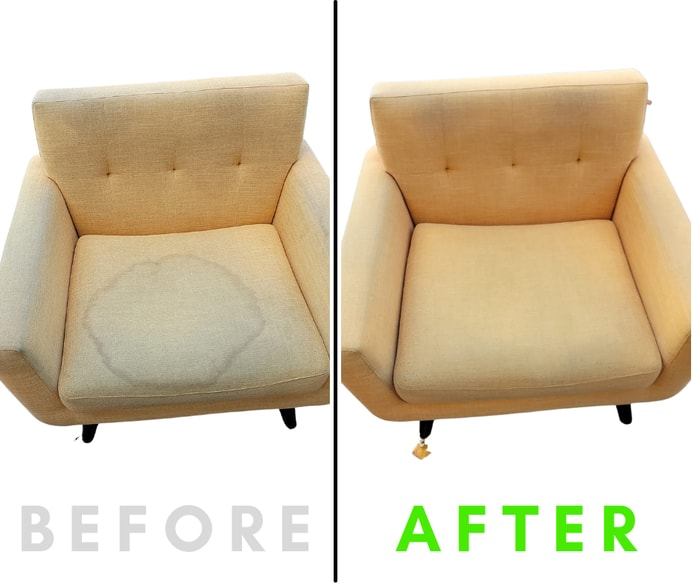Water stains on a couch after cleaning often occur due to over-wetting or using improper cleaning methods. Address the issue promptly to prevent lasting damage.
Water stains on your couch can be frustrating, especially after a thorough cleaning session. These unsightly marks usually result from excess moisture left behind or incorrect cleaning techniques. To avoid this problem, always use minimal water and ensure the fabric dries quickly.
Quick and effective solutions include blotting the area with a dry cloth, using a fan to speed up drying, or applying a vinegar and water solution. Proper maintenance and prompt action can keep your couch looking pristine. By taking the right steps, you can prevent water stains and extend the life of your furniture.

Credit: www.reddit.com
Common Causes
Water stains on your couch can be very frustrating. Understanding common causes helps you avoid these stains. Below, we discuss two main reasons: improper drying and cleaning product residue.
Improper Drying
Improper drying is a common cause of water stains. When you clean your couch, excess water can seep into the fabric. If not dried correctly, this water leaves marks. Using a fan or a hairdryer can help speed up drying. Always ensure the fabric is completely dry.
Consider these tips for proper drying:
- Use a fan to circulate air.
- Open windows to let in fresh air.
- Pat the area with a dry cloth.
- Avoid sitting on the couch until it is dry.
Cleaning Product Residue
Cleaning product residue can also cause stains. Many cleaning products leave behind residues. These residues attract dirt and cause stains. Always rinse your couch well after using a cleaner. Use a damp cloth to wipe away any residue.
Follow these steps to avoid residue:
- Read the cleaning product instructions carefully.
- Use a small amount of cleaner.
- Rinse the fabric with clean water.
- Wipe with a damp cloth until no residue remains.
By understanding these common causes, you can keep your couch looking fresh and clean. Proper drying and removing cleaning product residue are key.
Immediate Actions
Water stains on a couch after cleaning can be frustrating. Immediate action can prevent permanent damage. Quick responses can maintain your couch’s appearance. Below are effective steps to take right away.
Blotting Techniques
Blotting is essential for water stain removal. Use a clean, dry cloth. Press gently on the stained area. Avoid rubbing to prevent fabric damage. Blot until no more moisture transfers to the cloth.
For stubborn stains, use a slightly damp cloth. Blot with a dry cloth immediately after. This helps lift the stain without spreading it. Always work from the outside in.
Using Absorbent Materials
Absorbent materials can help with water stains. Use baking soda or cornstarch. Sprinkle it generously over the stain. Let it sit for 15 minutes.
Vacuum the powder away carefully. This can absorb excess moisture and reduce staining. Repeat if necessary for deeper stains.
For fabrics that tolerate heat, use a hairdryer. Set to low and keep a safe distance. Move it around to dry the area evenly. Avoid overheating to prevent fabric damage.
| Material | Action |
|---|---|
| Clean Cloth | Blot gently |
| Baking Soda | Sprinkle and wait |
| Hairdryer | Use on low heat |
These immediate actions can help manage water stains effectively. Quick responses are crucial. Keep these tips handy for the best results.
Homemade Remedies
Water stains on couches can be frustrating. Homemade remedies are simple and effective. They use ingredients found in most homes. Below, we explore two popular methods.
Vinegar Solution
Vinegar is a powerful cleaning agent. It helps break down stains. To make a vinegar solution, follow these steps:
- Mix one part vinegar with two parts water.
- Dip a clean cloth into the solution.
- Blot the stained area gently.
- Let it sit for 15 minutes.
- Blot with a dry cloth to remove excess moisture.
Vinegar removes water stains and also freshens fabric. Always test a small area first to check for colorfastness.
Baking Soda Paste
Baking soda is another effective remedy. It absorbs moisture and neutralizes odors. Here’s how to make a baking soda paste:
- Mix baking soda with a small amount of water.
- Stir until you get a thick paste.
- Apply the paste to the stained area.
- Let it sit for 30 minutes.
- Vacuum or brush off the dried paste.
This method works well for stubborn stains. It also leaves your couch smelling fresh.
Commercial Cleaners
Dealing with water stains on your couch can be frustrating. Commercial cleaners can help. They are designed to tackle tough stains. Let’s explore some effective options.
Upholstery Shampoos
Upholstery shampoos are a popular choice. They penetrate deep into fabric fibers. This helps to remove stubborn stains. Here are some benefits of using upholstery shampoos:
- Easy to apply
- Safe for most fabrics
- Effective on tough stains
Follow these steps for best results:
- Test the shampoo on a small area.
- Apply the shampoo evenly.
- Use a soft brush to scrub the stain gently.
- Rinse with a damp cloth.
- Let it dry completely.
Stain Remover Sprays
Stain remover sprays are another great option. They work quickly and are easy to use. Here are some key features:
| Feature | Benefit |
|---|---|
| Fast-acting formula | Removes stains in minutes |
| Spray nozzle | Evenly distributes the cleaner |
| Non-toxic | Safe for kids and pets |
To use stain remover sprays effectively:
- Shake the bottle well.
- Spray directly on the stain.
- Blot with a clean cloth.
- Repeat if necessary.
Preventive Measures
Water stains on a couch can be frustrating. Taking preventive measures helps avoid this problem. Below are some effective strategies to keep your couch clean and stain-free.
Regular Maintenance
Regular maintenance is crucial to keep your couch looking new. Dust your couch weekly using a soft cloth or a vacuum cleaner. A clean couch is less likely to get water stains.
- Vacuum regularly: Use the upholstery attachment to remove dust.
- Rotate cushions: This helps to distribute wear evenly.
These steps prevent dirt buildup. Dirt can turn into stubborn stains when wet.
Spot Cleaning
Spot cleaning is a great way to handle small spills. Act quickly to prevent water stains. Use a clean cloth to blot the spill.
- Blot, don’t rub: Rubbing can spread the spill.
- Use minimal water: Excess water can cause stains.
- Dry immediately: Use a fan or hairdryer to speed up drying.
For stubborn spots, use a mild cleaning solution. Always test it on a hidden area first.

Credit: www.reddit.com
Professional Help
Water stains on your couch can be frustrating. Especially after a recent cleaning. Sometimes, tackling these stains on your own isn’t enough. This is where professional help can make a difference. Professionals have the right tools and expertise to restore your couch. Let’s dive into when you should call experts and the cost considerations involved.
When To Call Experts
Knowing when to call experts can save your couch. Here are some signs that it’s time to reach out:
- Stains are large and cover a big area.
- Stains are deep and persistent.
- Your couch is delicate or made from rare materials.
- You’ve tried multiple methods and nothing works.
Professional cleaners can handle tough stains. They use specialized equipment and solutions. This ensures your couch gets the best care possible.
Cost Considerations
Wondering about the cost of professional cleaning? Here’s what you need to know:
| Service Type | Average Cost |
|---|---|
| Basic Cleaning | $50 – $100 |
| Deep Cleaning | $100 – $200 |
| Special Treatments | $150 – $300 |
Basic cleaning covers surface stains and minor spots. Deep cleaning tackles more stubborn stains and dirt. Special treatments include upholstery protection and odor removal. Always get quotes from multiple providers. This ensures you get the best price for the service you need.
Fabric Considerations
Water stains on a couch after cleaning can be frustrating. The type of fabric on your couch plays a crucial role. Each fabric reacts differently to water and cleaning solutions. Understanding fabric considerations can help you prevent water stains effectively.
Material-specific Tips
Different materials need unique care. Identify your couch fabric before cleaning. This table provides material-specific tips to help you handle water stains.
| Material | Cleaning Tips |
|---|---|
| Leather | Use a dry cloth. Avoid excess water. Apply leather conditioner. |
| Microfiber | Blot with a dry towel. Use a gentle fabric cleaner. Avoid soaking. |
| Cotton | Blot with a dry towel. Use a mild detergent solution. Air dry completely. |
| Velvet | Blot gently. Use a fabric brush. Avoid water; use a specialized cleaner. |
Delicate Fabrics
Delicate fabrics need extra care. The wrong method can cause damage. Follow these tips to clean delicate fabrics safely:
- Use a Gentle Cleaner: Choose a cleaner specifically designed for delicate fabrics.
- Test First: Always test on a hidden area. Ensure no discoloration occurs.
- Blot, Don’t Rub: Blot the stain gently with a dry cloth. Rubbing can damage fibers.
- Air Dry: Let the fabric air dry. Avoid heat sources which can cause shrinking.
These steps help maintain the integrity of delicate fabrics. Proper care prevents water stains and keeps your couch looking new.

Credit: pristinegreencleaning.com
Long-term Solutions
Dealing with water stains on your couch can be frustrating. After cleaning, these stains can leave unsightly marks. Implementing long-term solutions can help prevent this issue. This section covers effective methods to keep your couch stain-free for the long haul.
Protective Covers
Protective covers are an excellent way to safeguard your couch. They act as a barrier against spills, dirt, and water stains.
- Choose covers made from waterproof materials.
- Opt for covers that are machine-washable for easy maintenance.
- Ensure the cover fits snugly to prevent movement.
These covers are available in various colors and fabrics. They can also enhance your living room’s aesthetic.
Water-repellent Sprays
Water-repellent sprays offer another long-term solution. These sprays create a protective layer on your couch fabric, repelling water and stains.
- Clean the couch thoroughly before application.
- Spray evenly over the fabric.
- Allow the couch to dry completely.
Most sprays are easy to apply and dry quickly. They provide an invisible shield against spills.
| Product | Type | Features |
|---|---|---|
| UltraGuard Cover | Protective Cover | Waterproof, Machine-Washable, Snug Fit |
| ShieldSpray | Water-Repellent Spray | Quick Drying, Easy Application, Invisible Protection |
Using these long-term solutions can keep your couch looking new. Protective covers and water-repellent sprays are effective and easy to use.
Frequently Asked Questions
How Do You Get Water Stains Out Of A Fabric Couch?
Blot the stain with a clean cloth. Mix water and white vinegar in equal parts. Dab the solution on the stain. Blot again with a dry cloth. Repeat if necessary.
How To Get A Water Stain Out Of Fabric?
Blot the stain gently with a clean cloth. Mix equal parts vinegar and water. Dab the solution on the stain. Rinse with cold water. Air dry.
How Do You Fix A Water Damaged Couch?
Dry the couch quickly using fans and dehumidifiers. Clean with mild soap and water. Disinfect with alcohol.
Can Water Stains Become Permanent?
Yes, water stains can become permanent if not treated promptly. Act quickly to prevent lasting damage.
Why Do Water Stains Appear After Cleaning?
Water stains appear due to minerals in tap water. These minerals leave marks when they dry.
Conclusion
Removing water stains from your couch can be simple with the right techniques. Always test a small area first. Regular maintenance helps prevent future stains. Using the correct cleaning products ensures your couch stays spotless. With these tips, your couch can look fresh and inviting.
Enjoy a clean and cozy living space.





